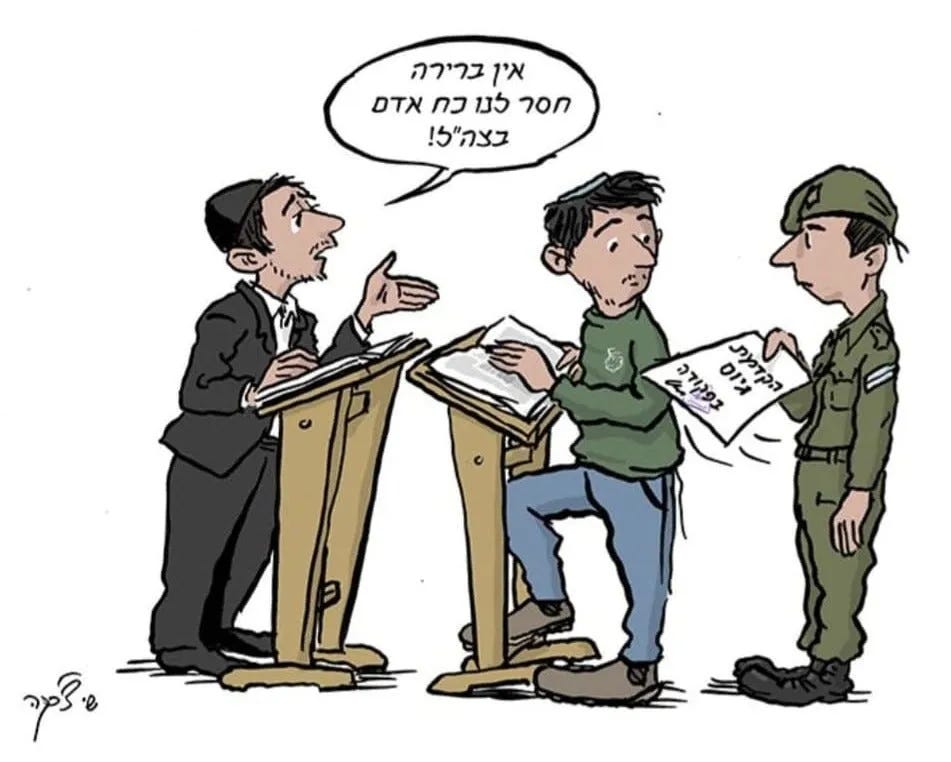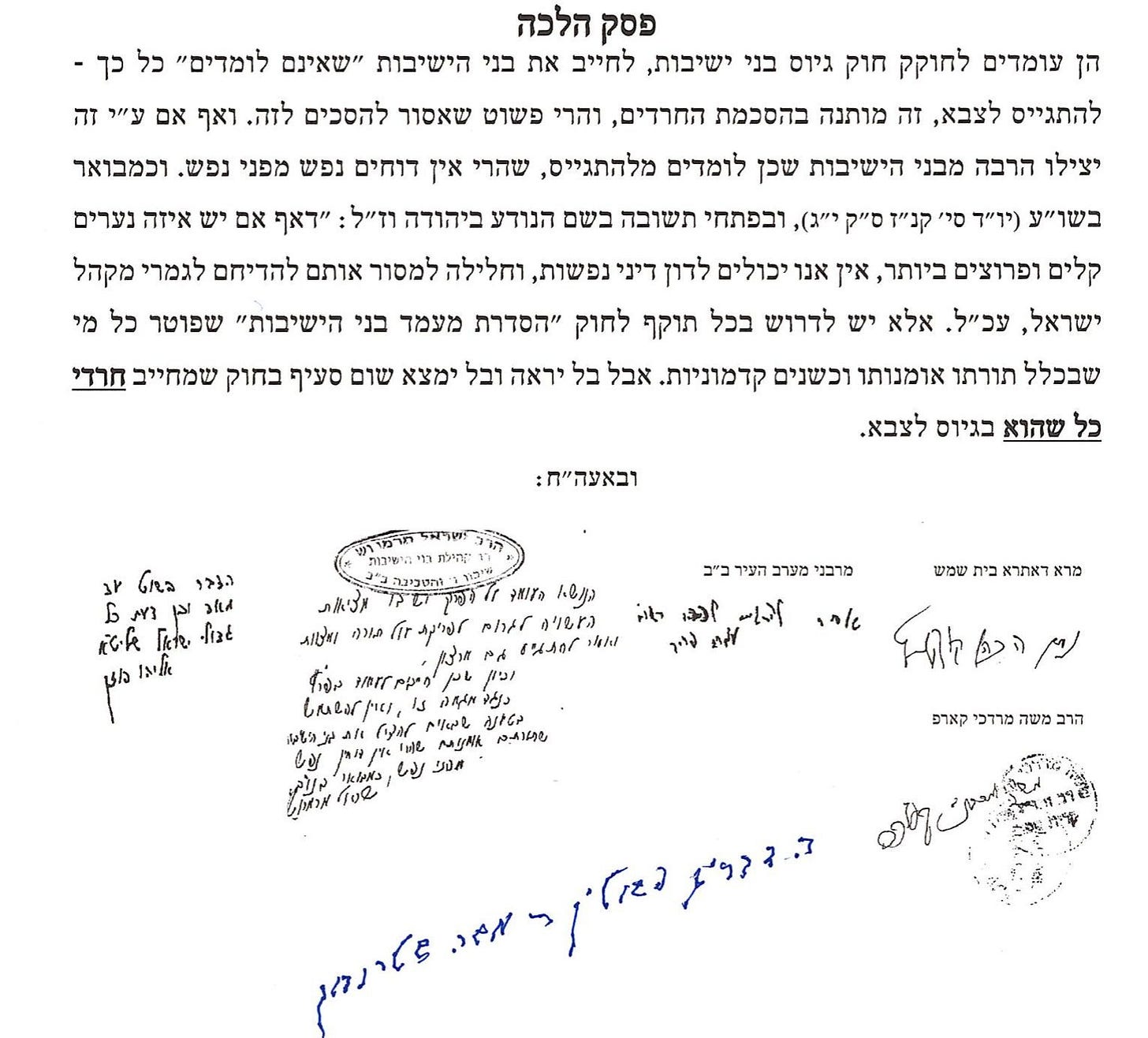Prioritizing Charedi Lives
The evolution of Charedi positions on IDF service
The evolution of charedi rabbinic opinions on IDF enlistment is extraordinary. The Chazon Ish sought exemption for a few hundred yeshiva students to rebuild the losses of the Holocaust, but ruled that if there is a military need, yeshiva students must enlist. The charedi rabbinic leaders of the next generation, such as Rav Shach and Rav Shteinman, believed in exempting endless thousands of yeshiva students, but were adamant that every charedi young man who is not learning must enlist, as otherwise it would lead to increased pressure on all charedim to enlist. Yet the current charedi rabbinic leadership is against anyone in the charedi community enlisting, even if they are not learning.
Still, the mainstream charedi rabbinic and political leadership have tentatively approved Likud’s so-called Draft Law. This was an obvious move for them, because it unlocks billions of dollars for their freeloading lifestyle, while doing nothing substantive to solve the IDF manpower shortage that has caused so much hardship for so many people. At most it will result in the enlistment of a very tiny number of charedi dropouts. The vast majority of the 80,000 or so draft-age charedim will receive a legal exemption and lots of money will flow again.
Still, even a token concession to enlisting a few dropouts is too much for the more extreme charedi rabbinic authorities, who issued a formal halachic ruling against it. And their reasoning is fascinating:
These rabbis acknowledge that drafting some of the non-learning charedim will relieve pressure for enlistment on the charedim who are actually learning. But they argue that halachically there is no way to prioritize learners over non-learners, invoking the principle of ain dochim nefesh mipnei nefesh, one may not prioritize one person’s life over that of another.
This is of course the exact opposite of the reasoning employed by Rav Shach and Rav Steinman. But I’m interested in a different aspect: the usage of the principle that one may not prioritize one person’s life over that of another.
How on earth can they invoke the principle that one does not prioritize one life over another?! The charedi community prioritizes the lives of everyone in their community over the lives (literally) of everyone else in the country! Two years of reservists in their thirties, forties and beyond, doing endless rounds of duty, with the huge toll that this takes on their jobs and family lives and marriages and health and sometimes their very lives, all because the charedi community refuses to send anyone to the army. Indeed, it was even a charedi MK who announced that dati young men have to be pulled out of yeshiva early due to the IDF manpower shortage!
So how can they talk about ain dochim nefesh mipnei nefesh? Well, the answer is unfortunately clear. But first, let’s ask another question: Why charedim don’t see themselves as contravening Rambam’s condemnation of a poresh min hatzibbur, someone who observes all the halachot but does not care about the suffering of the community?
The explanation is that from the charedi perspective, they are the tzibbur and it’s everyone else who has separated themselves off. (Of course, there happens to be the tiny matter of our Arab enemies who want to kill us all, and whom we need to fight, but the only war that matters to charedim is the “war on Torah.”) Similarly, non-charedim do not count as “nefesh,” and thus the lives and wellbeing of everyone in the charedi community can be prioritized over that of everyone else in the country without even the slightest twinge of guilt.
This may sound shocking but it’s self-evident. It’s something that we’ve seen before, such as with charedim using the verse “Shall your brothers come to war while you remain here?” to rally people against sharing the burden of military service. But it doesn’t need examples from extremists - it’s the reality of the entire charedi rabbinic and political leadership, which has had absolutely no interest in helping relieve the suffering of the nation due to the war.
Being charedi is fundamentally all about separating themselves off from everyone else with a distinct identity that is self-perceived as the only legitimate path, and they’ve simply taken that to its ultimate conclusion. They have split off into an entirely different people. Relative to charedi lives, non-charedi lives just don’t matter.





There are issues which mature adults can disagree about like mature adults. Today there are also issues in which taking a certain position by definition pretty much disqualifies a person from the "mature adult" category and from being deserving of any respectable leadership role. For example, a big issue in America now is whether high school boys who "identify" as female should be allowed to play competitive sports against actual, biological high school girls. I presume everyone reading Rabbi Slifkin's blog will consider it utterly foolish to allow such a thing and completely unnecessary to explain why.........and 80% of Americans agree. But guess what, Democrats aren't convinced, and this was among the reasons why Trump won. The Democrats are simply not living in reality and enough Americans realized this and voted accordingly.
It has become the same for the chareidim. Their positions are so inane, so silly, so childish, so extreme, etc...They have left reality. They cannot be taken seriously, they are not leaders, and they do not deserve anyone's respect.
Speaking the truth is not ‘sinas chinam’ and G-d only knows the Charedi leaders who don’t give two figs about secular or Dati Jews seem to engage in plenty of it themselves. Forgive me if I am fed up with the sheer arrogance and hypocrisy emanating from these holier than thou people. The same thing was being said regarding sexual abuse of children. The only people making the situation worse are the leaders of themselves.